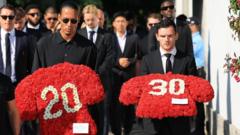Following the death of Pope Francis on Easter Monday, significant figures prepare to attend his funeral, set against a backdrop of global mourning and reflections on his enduring legacy, which emphasized compassion and advocacy for marginalized communities.
The World Bids Farewell to Pope Francis: A Legacy of Humility and Compassion

The World Bids Farewell to Pope Francis: A Legacy of Humility and Compassion
Global leaders, including Presidents Trump and Zelensky, converge in Rome as mourning rituals begin for the late Pope Francis, whose advocate-style papacy focused on humility, social justice, and the environment.
The passing of Pope Francis on Easter Monday has elicited a global wave of mourning and reflection, as leaders and citizens gather in Rome to pay their respects. His funeral is slated for Saturday at St. Peter's Basilica, attracting prominent figures like President Trump and President Zelensky of Ukraine, alongside a host of other global dignitaries.
Mourning rituals commenced with memorial Masses held worldwide, showcasing a heartfelt tribute to the pope's extensive contributions towards social justice, particularly in aiding migrants and the impoverished. His body is currently lying in repose at Casa Santa Marta, where he chose to live throughout his papacy, eschewing the more traditional, opulent Apostolic Palace.
At his funeral, Cardinal Giovanni Battista Re will preside over ceremonies reflective of Francis' commitment to humility and simplicity. The pope's instructive directives around the funeral rites embody his authenticity as a leader who prioritized connection with the marginalized and lived a life of service.
Amid the somber atmosphere following his death, Francis is remembered for his impactful teachings on climate change, social inequality, and human fraternity. His papacy symbolized a departure from traditional papal opulence, seeking instead to embody the struggles of the disadvantaged.
As the conclave to select his successor approaches, discussions around Francis’ legacy unfold in various dialogues, highlighting the changes he made within the church and the larger human community. Those who interacted with him recall both his compassionate demeanor and, at times, his playful spirit, leaving an indelible mark on both the faithful and the world at large.
Individuals worldwide—including in cities like Caracas, Manila, and Buenos Aires—hold vigils and services to honor the pope, reflecting on how his life resonated with millions. In a historic moment, the emphasis on addressing climate change has also entered the public consciousness, encouraging many to adopt sustainable practices as a lasting tribute to his vision of an equitable world for future generations.
His will, which stipulated a simple burial in St. Mary Major Basilica, echoes his lifelong commitment to living with authenticity and connection to believers, demonstrating a profound understanding of the roles of faith and community in the human experience. As the Vatican prepares for the transition to new leadership, Pope Francis’ ethos will continue to inform discussions on leadership in both religious and secular arenas.
Mourning rituals commenced with memorial Masses held worldwide, showcasing a heartfelt tribute to the pope's extensive contributions towards social justice, particularly in aiding migrants and the impoverished. His body is currently lying in repose at Casa Santa Marta, where he chose to live throughout his papacy, eschewing the more traditional, opulent Apostolic Palace.
At his funeral, Cardinal Giovanni Battista Re will preside over ceremonies reflective of Francis' commitment to humility and simplicity. The pope's instructive directives around the funeral rites embody his authenticity as a leader who prioritized connection with the marginalized and lived a life of service.
Amid the somber atmosphere following his death, Francis is remembered for his impactful teachings on climate change, social inequality, and human fraternity. His papacy symbolized a departure from traditional papal opulence, seeking instead to embody the struggles of the disadvantaged.
As the conclave to select his successor approaches, discussions around Francis’ legacy unfold in various dialogues, highlighting the changes he made within the church and the larger human community. Those who interacted with him recall both his compassionate demeanor and, at times, his playful spirit, leaving an indelible mark on both the faithful and the world at large.
Individuals worldwide—including in cities like Caracas, Manila, and Buenos Aires—hold vigils and services to honor the pope, reflecting on how his life resonated with millions. In a historic moment, the emphasis on addressing climate change has also entered the public consciousness, encouraging many to adopt sustainable practices as a lasting tribute to his vision of an equitable world for future generations.
His will, which stipulated a simple burial in St. Mary Major Basilica, echoes his lifelong commitment to living with authenticity and connection to believers, demonstrating a profound understanding of the roles of faith and community in the human experience. As the Vatican prepares for the transition to new leadership, Pope Francis’ ethos will continue to inform discussions on leadership in both religious and secular arenas.



















